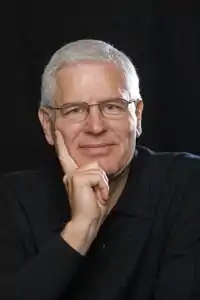Richard Stearns (World Vision)
Richard Stearns was the president of World Vision United States, an international Christian relief charity based in Federal Way, Washington, from 1998 to 2018.[1][2]
Richard Stearns | |
|---|---|
 | |
| Born | Richard Stearns |
| Spouse(s) | Renee Stearns |
| Children | 5 |
Biography
Stearns holds a bachelor's degree from Cornell University, where he joined the Phi Kappa Psi fraternity and studied neurobiology,[3] and an MBA from the Wharton School at the University of Pennsylvania.[4] His professional career began in marketing with the Gillette Company in Boston. From 1977 to 1985, he held various roles with Parker Brothers, culminating in his appointment as president in 1984.[5] In 1985, he became a vice president at The Franklin Mint, then joined Lenox in 1987 as president of Lenox Collections. In 1995, Stearns was named president and chief executive officer of Lenox, Inc., overseeing three divisions, six manufacturing facilities, 4,000 employees, and $500 million in annual sales. He left Lenox[2] when in June 1998 he became president of World Vision.[6]
As president of World Vision Inc., Stearns was responsible for U.S. operations, which included advocacy, fundraising, and program development, and prioritized the organization's worldwide attention on the AIDS crisis.[6]
Publications
He writes op-eds on global poverty and AIDS for major U.S. newspapers and magazines, and has appeared on CNN, Fox, ABC, NBC, and PBS. Examples include "Evangelicals and the Case for Foreign Aid" Samaritans on the AIDS crisis and The face of America should meet the face of poverty
The Hole in Our Gospel
While Stearns believes that individual Christians and churches have a responsibility to take action to alleviate global poverty, he has discouraged unilateral action in which churches launch their own programs around the world. Stearns has argued that churches "think we can somehow tackle [global poverty] using only amateurs and volunteers." Churches hire expert consultants to assist them in managing their local congregations like successful businesses: music, accounting, audiovisual support, counseling, and building construction. Shouldn't Christians do the same to assist with realizing their global mission, which involves them in "tackling complicated problems halfway around the world?" Stearns says that solving poverty is incredibly complex, that it is more like rocket science in its difficulty than people realize.[5]
Moral Criticisms
Albert Mohler criticized a policy decision Stearns and the World Vision Board made regarding employment of members of same sex marriages. The World Vision Board has since changed that policy.[7]
References
- Christianity Today, January 9, 2018
- Tu, Janet I. (August 23, 2009), "World Vision's Richard Stearns sets out to put an end to global poverty", The Seattle Times, retrieved February 26, 2010
- Stearns, R., Goodbye, Christian America; Hello, True Christianity, Huffington Post, 11/06/2012 12:43 pm EST, accessed 1/24/2015
- Kawasaki, G., Ten (or so) Questions with Richard Stearns, President of World Vision, May 14, 2007. How to Change the World: A practical blog for impractical people. Accessed 1/24/2015
- Richard Stearns, World Vision, accessed 1/24/2015
- "Leaders Entrusted With Stewardship: Profiles of World Vision's U.S. leadership". World Vision. Archived from the original on March 15, 2010. Retrieved February 26, 2010.
- c, A., Pointing to Disaster — The Flawed Moral Vision of World Vision, Tuesday, March 25, 2014, www.AlbertMohler.com, accessed 1/24/2015
External links
- 2007/05 Interview with Guy Kawasaki: "Ten (or so) Questions with Richard Stearns, President of World Vision"
- Q & A:Richard Stearns, Christianity Today, 10/17/06